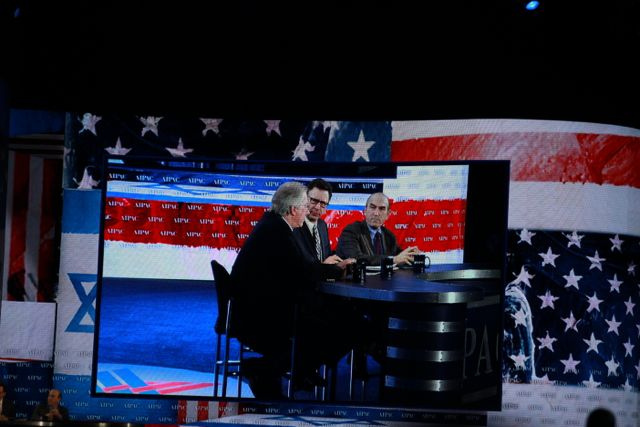by Eli Clifton
The American Israel Public Affairs Committee’s annual conference is a Washington DC ritual in which the group celebrates its bipartisan bona fides with Republican and Democratic members of Congress making speaking appearances. And that’s where AIPAC’s strength has traditionally been measured: its ability to whip votes on both sides of the aisle. But a review of AIPAC’s 2016 lineup of conference speakers reveals a sharp decline in the group’s bipartisan pull.
By all accounts, 2015 was a rough year for AIPAC. The group took sides with Israeli Prime Minister Benjamin Netanyahu and congressional Republicans to make a full-court press against the efforts of the White House and the P5+1 to negotiate a nuclear agreement with Iran. The group even went so far as to devote $30 million to a pressure group, Citizens for a Nuclear Free Iran, dedicated to scuttling the nuclear accord. Memorably, AIPAC snapped at Obama’s warning that “many of the same people who argued for the war in Iraq are now making the case against the Iran nuclear deal.”
Marshall Wittmann, AIPAC’s communications director, made a point of denying that the group had taken any position on the invasion of Iraq and said Obama was making “an entirely false and misleading argument.”
Wittmann was lying. LobeLog published the group’s 2001-2004 briefing book, which argued for Saddam Hussein’s removal from power. AIPAC’s October 7, 2002 newsletter promoted the George W. Bush administration’s erroneous claims that Saddam Hussein was involved with the terrorist attacks on September 11, 2001.
AIPAC’s attacks on the White House’s nuclear diplomacy came to a head in September. Senate Democrats halted a vote on a resolution of disapproval. Only four Senate Democrats crossed the aisle to join Republicans opposed to the deal.
In the House, Republicans joined by 25 Democrats rejected a resolution approving of the nuclear deal.
Those 25 congressional Democrats appear to be the only group of House or Senate Democrats RSVP’ing for AIPAC’s 2016 policy conference. The speakers list includes 12 of the House Democrats who voted against the nuclear deal: Reps. Brad Ashford (NE), Ted Deutch (FL), Eliot Engel (NY), Gwen Graham (FL), Alcee Hastings (FL), Steve Israel (NY), Ted Lieu (CA), Donald Norcross (NJ), Kathleen Rice (NY), David Scott (GA), Brad Sherman (CA), and Juan Vargas (CA).
No Senate Democrats are named on the confirmed speakers list.
The narrow group of Democrats appearing at the conference certainly suggests a deep divide between congressional Democrats and AIPAC. Moreover, AIPAC appears to have made little headway in healing the rift with Democrats since September.
Following AIPAC’s stinging defeat last year, Bloomberg View columnist Eli Lake detailed the ways in which AIPAC was seeking to reach out to Democrats who supported the deal and mend fences after the brutal battle waged by AIPAC against the White House. Lake concluded that AIPAC simply couldn’t afford to punish Democrats for their votes supporting the accord.
“The lobby’s core mission is to protect and enhance the U.S.-Israel relationship,” wrote Lake. “You can’t do that if all your friends in Washington belong to one political party, particularly when the president belongs to the other one.”
AIPAC’s shallow field of Democratic speakers doesn’t give the impression that the pro-Israel pressure group has made many inroads with congressional Democrats. But it does suggest that either through declining invitations or not receiving them at all, Democrats who supported the nuclear deal with Iran aren’t a part of AIPAC’s annual show of bipartisan strength.
Photo: Elliott Abrams speaking at AIPAC






I agree. There are only 5 Republican congress members listed while there are 12 Democrats.